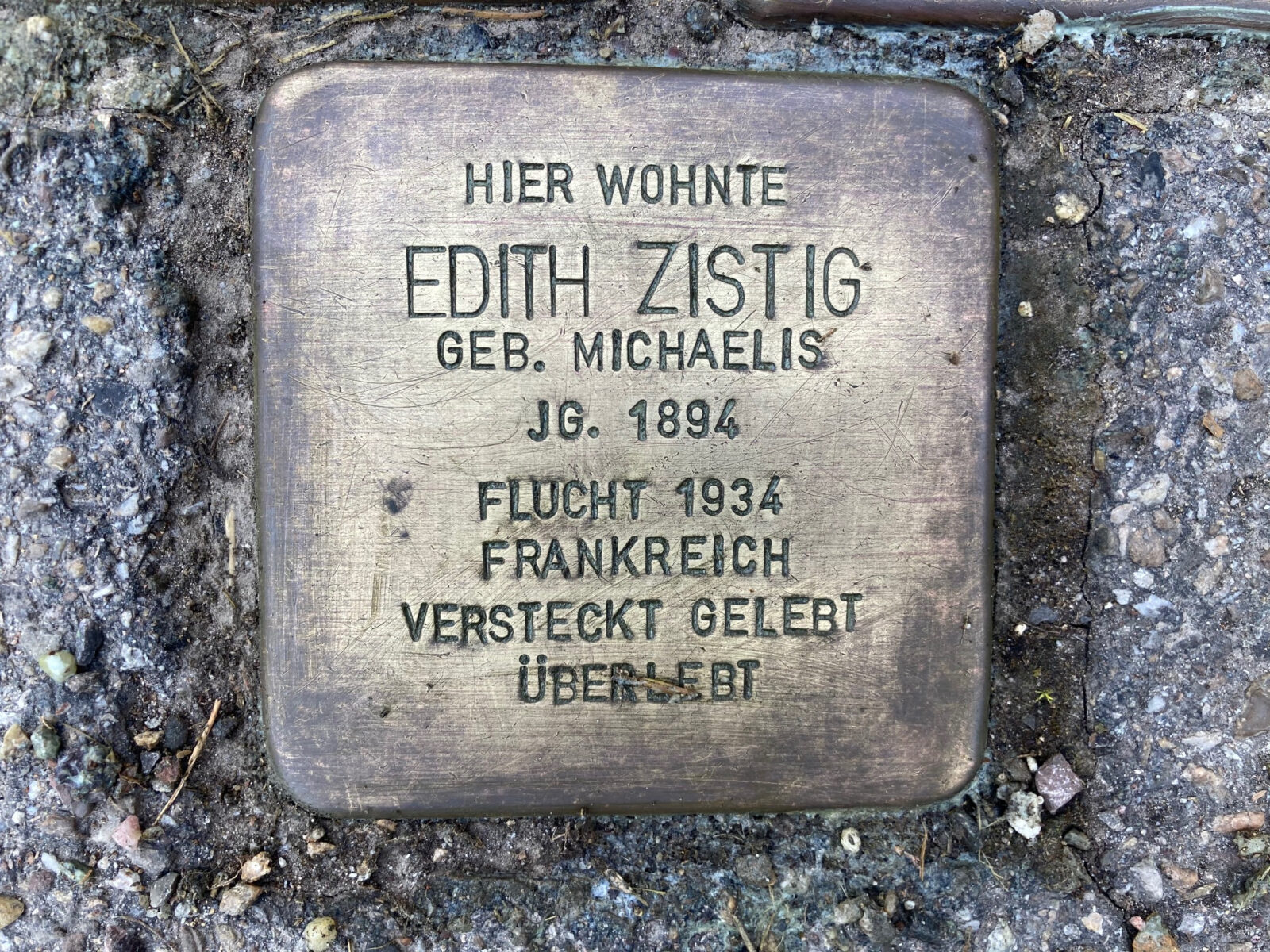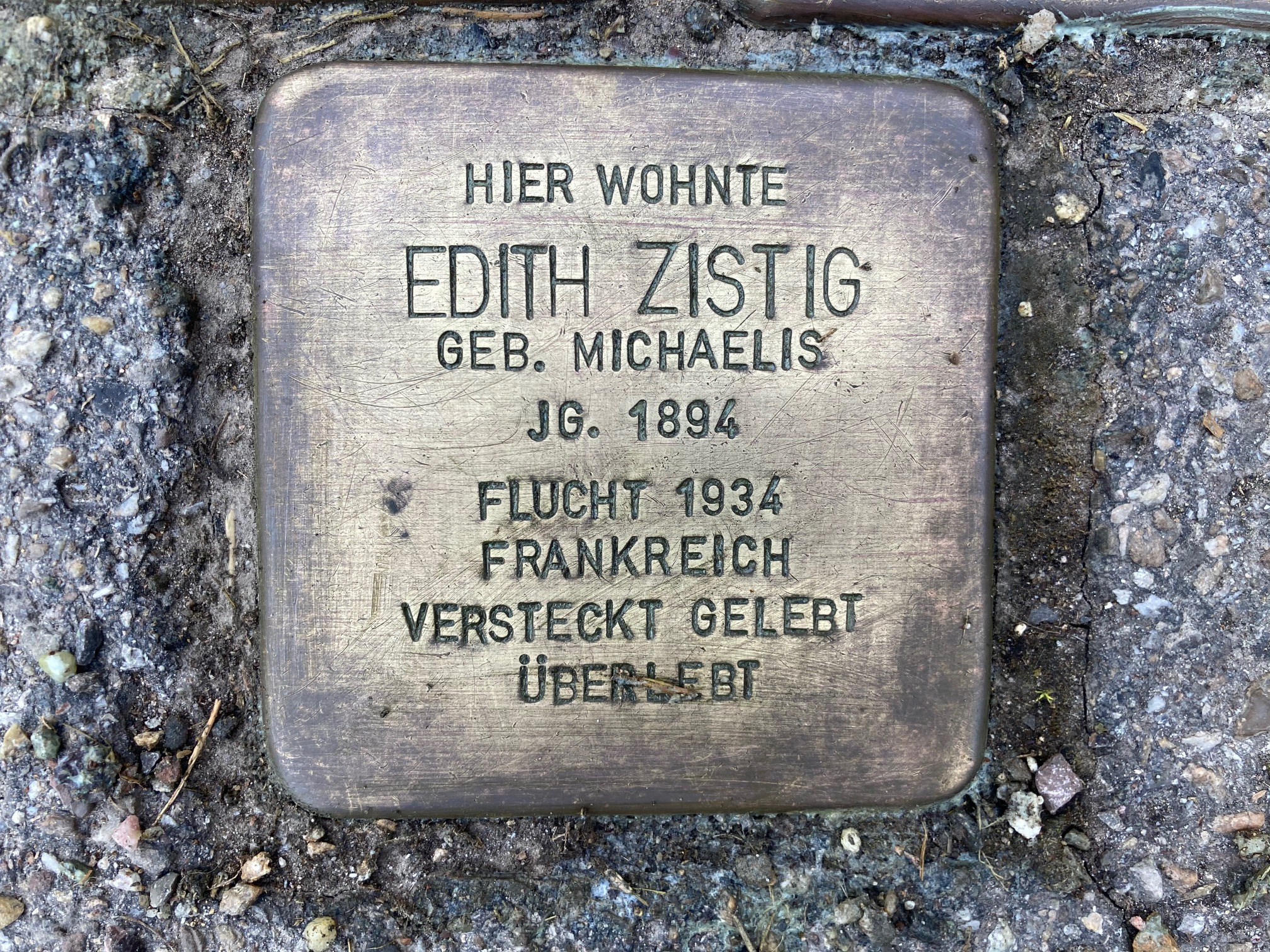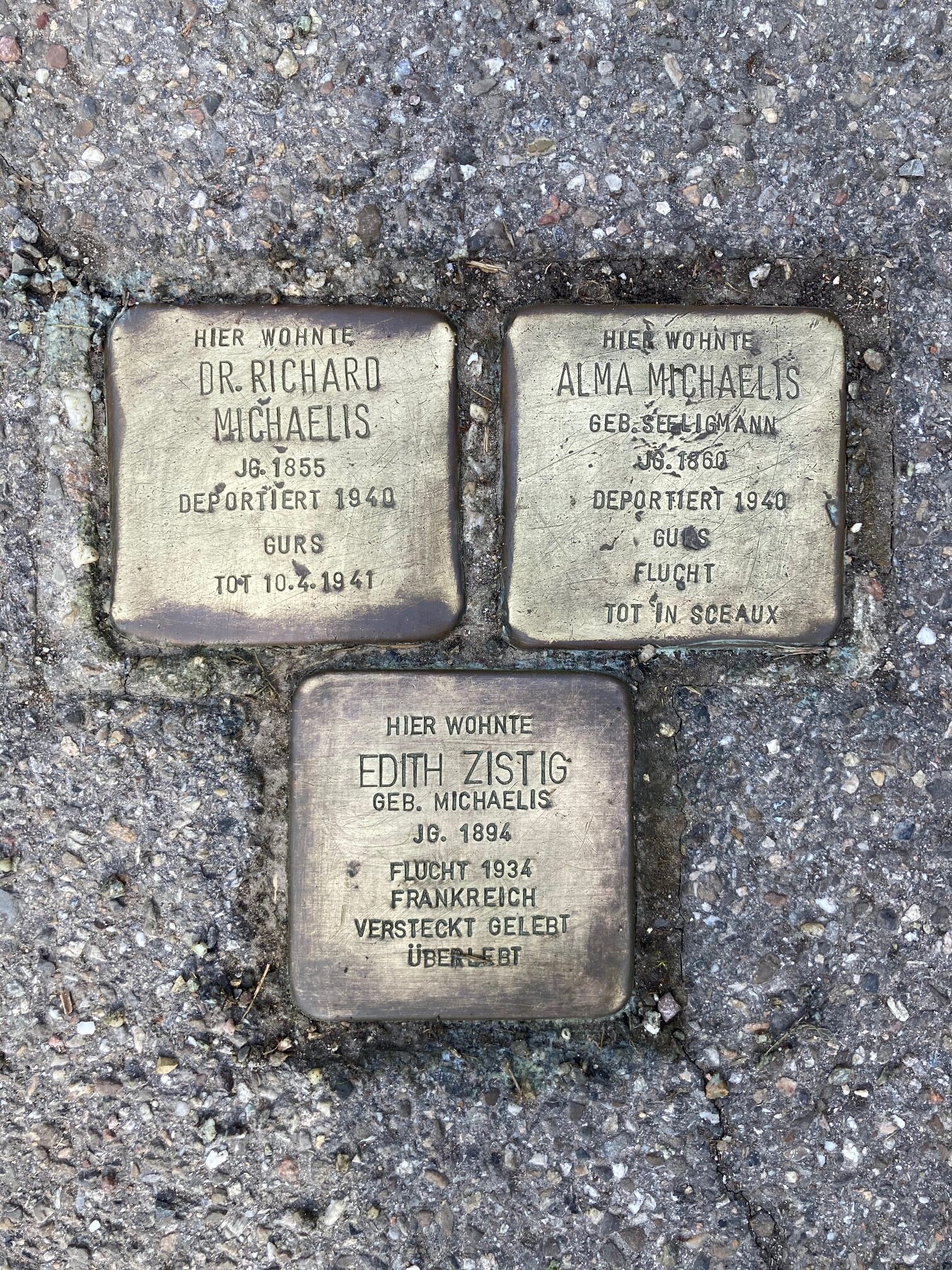
Edith Zistig
Am 21. April 1894 wurde sie als EDITH MICHAELIS in Zabern (Saverne) geboren. Sie war die einzige Tochter von Dr. RICHARD MICHAELIS 202 und ALMA MICHAELIS 201 . Sie ist Fotografin von Beruf und verheiratet mit Karl Zistig aus Freiburg. Die kinderlose Ehe wird Anfang der 1930er Jahre geschieden.
Vor allem aber wegen der antijüdischen Stimmung und der drohenden Ausschreitungen durch die Nazis flieht EDITH ZISTIG schon 1933 zuerst nach München, wo sie als Angestellte in einem Photogeschäft auf der Leopoldstraße arbeitet. Schnell muss EDITH ZISTIG erkennen, dass die Lebensbedingungen für jüdische Menschen auch in Bayern drastisch erschwert worden sind, und sie handelt umgehend : Erneut flieht sie im Februar 1934, jetzt ins französische Nizza, wo sie in der Hoffnung auf beruflichen Erfolg und bei extremster Distanz zu Nazi-Deutschland das Wagnis auf sich nimmt, ein eigenes Photogeschäft zu eröffnen. Der kühne Plan geht auf. Erst 1943, also viele Jahre später, wird ihrem jungen Unternehmen unter dramatischen Bedingungen ein Ende bereitet werden.
Die Probleme bereiten sich an anderer Stelle vor : In Freiburg werden am 22. Oktober 1940 ihre in der Wintererstr. 4 wohnenden Eltern verhaftet und in das Internierungslager KZ-Gurs deportiert. Der Vater verstirbt schon am 10.3.1941 in diesem schrecklichen Lager. Es gelingt EDITH ZISTIG, ihre Mutter ALMA MICHAELIS noch im selben Monat aus dieser engen, lebensbedrohenden Gefangenschaft freizubekommen (zu „liberieren“). Sie lebt dann in den Orten Betharram (Basses-Pyrhénées) und später in Vence (Alpes-Maritimes). Beide Orte liegen im Süden Frankreichs. Betharran gilt als résidence surveillée und damit als ein weniger strikt überwachtes und geringer belegtes Lager mit insgesamt besseren Überlebensbedingungen. Vence liegt dann in unmittelbarer Nähe zu ihrem eigenen Wohnort Nizza und schafft lebenserhaltende Nähe zwischen Mutter und Tochter.
Doch die Besetzung Gesamt-Frankreichs durch die Truppen Nazi Deutschlands im August 1943 beendet das kurze Interim beider zuletzt an der Côte-d’Azur. Um als „deutsche Jüdinnen“ zu überleben, verbleibt für beide Frauen jetzt nur das Untertauchen in die Illegalität. Das bedeutet für EDITH ZISTIG die Aufgabe und den überstürzten Verkauf ihres Photogeschäftes in Nizza, die Flucht nach Paris und ihr Verstecken dort. Der Mutter bleibt – allein auf sich gestellt, doch von der Tochter (wie eigentlich ?) materiell unterstützt – das Verstecktsein in Vence im südfranzösischen Hinterland nicht erspart. Allerdings mit der beruhigenden Hilfe liebenswerter Nachbarn, die der alten Dame guttun und sie überleben lassen.
Dann August 1944: Endlich wird Frankreich durch die alliierten Truppen befreit. ANNA MICHAELIS kann zur Tochter nach Paris ziehen. Dort verstirbt sie bereits 1946 im Alter von über 80 Jahren. Lange Zeit war ihr Dasein von Entrechtung, Demütigung, von Verlust von Hab und Gut und schließlich von ständiger Lebensbedrohung als jüdisch-deutsche Bürgerin überschattet.
Die nächsten Jahre von EDITH ZISTIG – sie wohnt seit 1948 in Paris 7e, 153, rue de Grenelle – sind geprägt von Zeiten absoluter Bedürftigkeit, dann von kleinen Hoffnungen, beruflich wieder Fuß zu fassen. Tatsächlich kommt sie zeitweise als Angestellte in einem Pariser Atelier unter; aber der große Traum der Selbständigkeit lässt sie bis weit über das 60. Lebensjahr hin warten. Immer wieder stößt sie wegen fehlender Nachweise, verstorbener Zeugen, wegen angezweifelter Aussagen, der unausgereiften Gesetzeslage oder schließlich wegen ihres geringen Alters auf aufschiebende Hürden. Nach Mitte der 1950er Jahre gelingt es ihr endlich, mit juristischer Hilfe Wiedergutmachungs- und Restitutionsleistungen zu erstreiten. Diese setzen der ewigen Bettelei um das Überleben von 2 oder 3 Monaten ein Ende. In ihrem Falle ist es besonders bedrückend, wie durch zögerlich-abwehrende Haltung der deutschen Erstattungsbehörden viele ehemals Verfolgte zweifach bestraft werden. Durch die Verwehrung eines Vorschusses auf ihre Schadenserstattung wird ihnen die finanzielle Hilfe zu einem schnelleren Neuanfang verunmöglicht.
Erst in den 1960er Jahren erreicht EDITH ZISTIG in einem neuen Verfahren und bei günstigerer juristischer Sicht eine finanzielle Einigung, die ihre eigene wie auch die Situation ihrer Eltern in einer Gesamtlösung auf eine menschlich befriedigende Weise berücksichtigt.
Quellen: Staatsarchiv Freiburg, F 196/1-2461, -2105, -8590, und F 166/3-4814.
She was born EDITH MICHAELIS in Zabern (Saverne) on 21 April 1894. She was the only daughter of Dr. RICHARD MICHAELIS 202 and ALMA MICHAELIS 201 . She was a photographer by profession and married Karl Zistig from Freiburg. The childless marriage is divorced in the early 1930s.
Mainly because of the anti-Jewish sentiment and the threat of riots by the Nazis, EDITH ZISTIG first flees to Munich in 1933, where she works as a clerk in a photo shop on Leopoldstreet. EDITH ZISTIG quickly realised that living conditions for Jewish people in Bavaria had also become drastically more difficult, and she acted immediately: she fled again in February 1934, this time to Nice in France, where she took the risk of opening her own photo shop in hopes of professional success and at an extreme distance from Nazi Germany. The bold plan works out. It is not until 1943, many years later, that her young enterprise will come to an end under dramatic conditions.
The problems prepare themselves elsewhere: On 22 October 1940, her parents, who live at Wintererstreet 4 in Freiburg, are arrested and deported to the internment camp KZ-Gurs. Her father died in this terrible camp on March 10 1941. EDITH ZISTIG succeeds in freeing („liberating“) her mother ALMA MICHAELIS from this tight, life-threatening imprisonment in the same month. She then lives in the towns of Betharram (Basses-Pyrhénées) and later in Vence (Alpes-Maritimes). Both places are in the south of France. Betharran is considered a résidence surveillée and thus a less strictly supervised and less crowded camp with better overall survival conditions. Vence is then in close proximity to her own home in Nice and creates life-sustaining closeness between mother and daughter.
But the occupation of all of France by Nazi Germany’s troops in August 1943 ends the two’s brief interim on the Côte-d’Azur. In order to survive as „German Jews“, the only option left for both women is to go into hiding and become illegal. For EDITH ZISTIG, this means giving up and hastily selling her photo business in Nice, fleeing to Paris and hiding there. The mother – left to her own devices, but supported materially by her daughter (how?) – is not spared hiding in Vence in the southern French hinterland. However, with the reassuring help of kind neighbours who help the old woman survive.
Then August 1944: France is finally liberated by the Allied troops. ANNA MICHAELIS can move to her daughter in Paris. She died there in 1946 at the age of over 80. For a long time her existence was overshadowed by disenfranchisement, humiliation, loss of possessions and finally by the constant threat to her life as a Jewish-German citizen.
The next years of EDITH ZISTIG
– she lived in Paris 7e, 153, rue de Grenelle since 1948
– are marked by times of absolute neediness, then by small hopes of regaining her footing professionally. In fact, she was temporarily employed in a Parisian studio, but the great dream of self-employment kept her waiting until well past the age of 60. Time and again, she came up against suspensive obstacles due to a lack of evidence, deceased witnesses, doubted statements, the immature state of the law or, finally, her young age. After the mid-1950s, she finally succeeded in obtaining reparation and restitution payments with legal help. These put an end to the eternal begging for survival of 2 or 3 months. In her case, it is particularly depressing how many former persecutees are doubly punished by the hesitant and defensive attitude of the German restitution authorities. By being denied an advance on their restitution, they are prevented from receiving the financial help they need to make a new start more quickly.
It was not until the 1960s that EDITH ZISTIG, in a new procedure and with a more favourable legal perspective, reached a financial settlement that took into account her own as well as her parents‘ situation in an overall solution in a humane, satisfactory way.
Quellen: Staatsarchiv Freiburg, F 196/1-2461, -2105, -8590, und F 166/3-4814.
Le 21 avril 1894, elle est née EDITH MICHAELIS à Zabern (Saverne). Elle était la fille unique du Dr. RICHARD MICHAELIS 202 et d’ALMA MICHAELIS 201 . Elle est photographe de profession et mariée à Karl Zistig de Fribourg. Le mariage, sans enfant, se termine par un divorce au début des années 1930.
Mais c’est surtout en raison du climat anti-juif et de la menace de débordements par les nazis qu’EDITH ZISTIG s’enfuit dès 1933, d’abord à Munich, où elle travaille comme employée dans un magasin de photographie de la Leopoldstrasse. Rapidement, EDITH ZISTIG se rend compte que les conditions de vie des personnes juives sont devenues drastiquement plus difficiles, même en Bavière, et elle agit immédiatement : elle s’enfuit à nouveau en février 1934, maintenant à Nice, en France, où elle prend le risque d’ouvrir son propre magasin de photographie dans l’espoir de réussir professionnellement tout en gardant une distance extrême avec l’Allemagne nazie. Le plan audacieux fonctionne. Ce n’est qu’en 1943, soit bien des années plus tard, que sa jeune entreprise prendra fin dans des conditions dramatiques.
Les problèmes se préparent ailleurs : à Fribourg, le 22 octobre 1940, ses parents, qui habitent la Wintererstr. 4, sont arrêtés et déportés au camp d’internement de KZ-Gurs. Le père est mort dans ce terrible camp dès le 10 mars 1941. EDITH ZISTIG réussit à faire libérer (à „libérer“) sa mère ALMA MICHAELIS le même mois de cette captivité étroite qui mettait sa vie en danger. Elle vit alors dans les localités de Bétharram (Basses-Pyrénées) et plus tard à Vence (Alpes-Maritimes). Ces deux localités sont situées dans le sud de la France. Betharran est considéré comme une résidence surveillée et donc comme un camp moins strictement surveillé et moins occupé, offrant globalement de meilleures conditions de survie. Vence se trouve alors à proximité immédiate de son propre lieu de résidence, Nice, et crée une proximité vitale entre la mère et la fille.
Mais l’occupation de la France entière par les troupes de l’Allemagne nazie en août 1943 met fin au bref intérim des deux dernières sur la Côte d’Azur. Pour survivre en tant que „juives allemandes“, les deux femmes n’ont d’autre choix que de se cacher dans l’illégalité. Pour EDITH ZISTIG, cela signifie l’abandon et la vente précipitée de son magasin de photos à Nice, la fuite vers Paris et la clandestinité. La mère – seule, mais soutenue matériellement par sa fille (comment ?) – n’est pas épargnée par la clandestinité à Vence, dans l’arrière-pays du sud de la France. Mais avec l’aide rassurante de voisins aimables, qui font du bien à la vieille dame et lui permettent de survivre.
Puis août 1944 : la France est enfin libérée par les troupes alliées. ANNA MICHAELIS peut aller vivre chez sa fille à Paris. Elle y décède en 1946, à l’âge de 80 ans. Pendant longtemps, son existence a été assombrie par la privation des droits, l’humiliation, la perte de ses biens et finalement par une menace permanente sur sa vie en tant que citoyenne juive allemande.
Les années suivantes d’EDITH ZISTIG – elle habite depuis 1948 à Paris 7e, 153, rue de Grenelle – sont marquées par des périodes de dénuement absolu, puis par de petits espoirs de reprendre pied professionnellement. En effet, elle est parfois employée dans un atelier parisien, mais le grand rêve d’indépendance se fait attendre bien au-delà de ses 60 ans. Elle se heurte sans cesse à des obstacles suspensifs en raison de l’absence de preuves, de témoins décédés, de déclarations mises en doute, de l’immaturité de la législation ou enfin de son jeune âge. Après le milieu des années 1950, elle parvient enfin, avec l’aide de juristes, à obtenir des réparations et des restitutions. Celles-ci mettent fin à l’éternelle mendicité pour survivre deux ou trois mois. Dans son cas, il est particulièrement oppressant de voir comment l’attitude hésitante et défensive des autorités allemandes en matière de restitution pénalise doublement de nombreuses personnes autrefois persécutées. En leur refusant une avance sur le remboursement de leurs dommages, on les empêche d’obtenir une aide financière pour prendre un nouveau départ plus rapidement.
Ce n’est que dans les années 1960 qu’EDITH ZISTIG obtient, dans le cadre d’une nouvelle procédure et d’une perspective juridique plus favorable, un accord financier qui tient compte de sa propre situation ainsi que de celle de ses parents dans une solution globale, d’une manière humainement satisfaisante.


